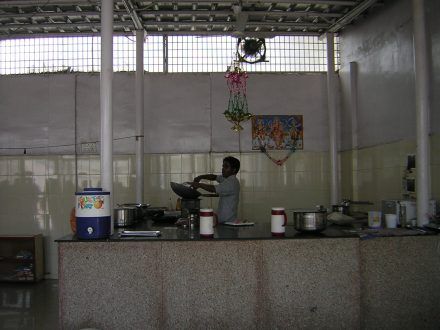Sahyog De-addiction Centre: holistic rehabilitation for Delhi’s children in contact with the law
27th March 2013

Jo Honeybone reports from a vist to the Sahyog De-addiction Centre in Delhi where since it was founded in 2011, 300 children from 8 to 18 years have come for rehabilitation and vocational training.
On 16th April, 15 participants attending the International Colloquium on Juvenile Justice in Delhi, India, visited the ‘Sahyog De-addiction Centre’ managed by the Society for Promotion of Youth and Masses (SPYM), a Delhi-based NGO, for children who come into conflict with the law as a result of their addiction to drugs and subsequent crime.
For the Colloquium participants – lawyers, justice and human rights experts, and child and youth professionals who had arrived from Africa, the US, Europe, other parts of Asia and India – the visit to the SPYM Sahyog Centre provided a poignant and important context and ‘reality check’ for the next two days of what was to be intensive discussions on juvenile justice issues, ranging from the minimum age of criminal responsibility to appropriate restorative justice measures for children.
We were introduced to Raju, a well presented and articulate youth, who enthusiastically told us about his motor mechanics training; a scheme set up by the Centre in collaboration with industrial firm Kirloskar Brothers, providing not only recognised training, but practical work experience. (42 boys have been trained in motor mechanics so far, with 17 securing employment at the Kirloskar service centre in Delhi.) Another youth, Saddam, bounded out of the Centre’s basic yet clean kitchen. He had just finished the preparation, cooking and serving of lunch for the boys. Saddam is just one of 124 boys who have received training in food production in collaboration with the Government of Delhi’s Industrial Training Institute, and one of the team of 10 boys managing the meals at the Centre. A key requirement for a home of growing boys!
Meeting these well-presented and polite boys, mostly aged between 14-16 years, it is hard to imagine that their lives were recently dominated by their addiction to drugs such as Ganja, alcohol, Fluid and smack, and the crime that caused and fuelled their drug addiction. Having been picked up by the police, they appear before the Juvenile Justice Board. Many boys get sent to government run detention centres or, after paying a small fee, are let off, but this just means returning to a life of crime and drugs. It is the lucky ones who get referred to the SPYM Sahyog Centre.
Going into a small room at the Centre, which acts as a library and literacy room, one begins to understand more of the background of these boys. We were told how 237 boys have been enrolled in the literacy project, with 138 having attained levels 0-4; with 70% of the boys having dropped out of education at primary level, this is a key achievement. But it was the pictures on the wall which said more than these statistics could ever say. The boys had drawn pictures of their lives on the street or at home; they may have been cartoon style drawings, but they portrayed scenes of violence, fear and poverty. The drawings are part of the holistic range of services that the Centre provides from detoxification, counselling and psychotherapy, to vocational skills and education development, to yoga, dance and art.
As Raju and Saddam told us their stories, the other boys listened and nodded. It was clear that the boys felt a sense of peer support and this is strongly encouraged at the Centre. The manager explained how the boys meet as a ‘parliament’ to discuss and decide on work tasks, governance, any complaints or issues at the Centre. No supervisors or adults take part in this and the boys proudly tell us how they make joint decisions and manage and resolve issues themselves.
SPYM has been working on de-addiction issues for the past 27 years, but the Sayhyog Centre was established only in March 2011, in collaboration with the Indian Government’s Department of Women and Child Development. The government of Delhi State provide the building, electricity and water but SPYM run and have to self-finance the Centre. More than 300 children from 8-18 years old have been treated at the Centre so far.
Having visited the Sayhog Centre, the participants were able to begin the Colloquium with the boys’ voices clearly in their minds, joined by their knowledge of experiences of children in conflict with the law in their own countries. The Colloquium took place at the National Law University in Delhi. Organised by Indian NGO HAQ: Child Rights and supported by PRI, UNICEF, Save the Children, Child Fund, CordAid and other partners, over 60 participants from 13 different countries and India, discussed key juvenile justice issues, sharing and learning from respective countries’ experiences and juvenile legislation and processes.